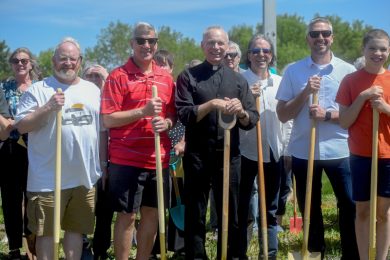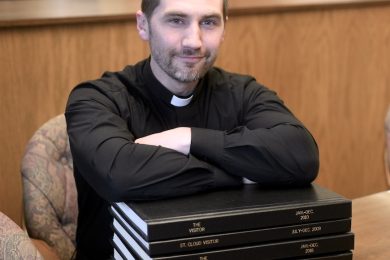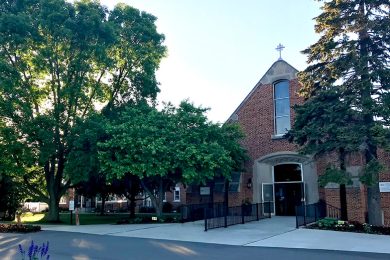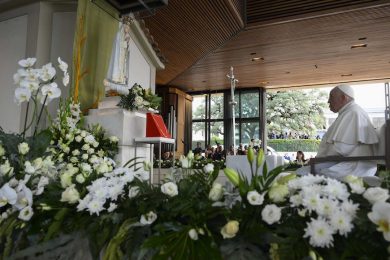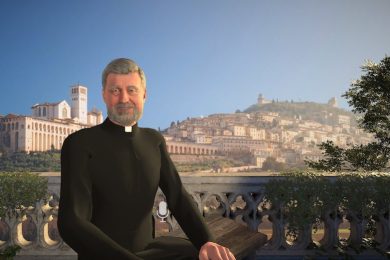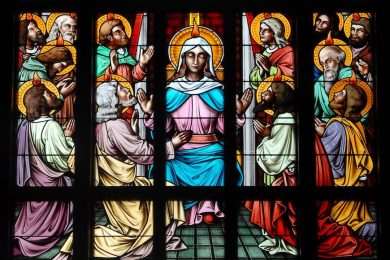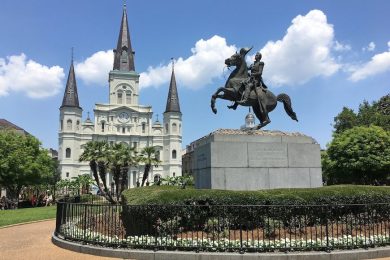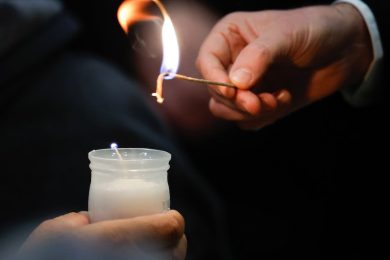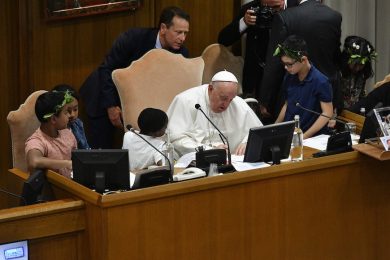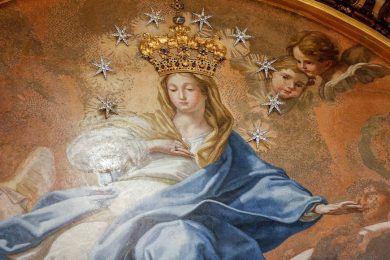Each month, The Central Minnesota Catholic is examining one of the seven themes of Catholic social teaching. Included are an article explaining the theme, a feature story highlighting the theme (see related story on federal district judge Frank Kundrat) and items for lesson planning.
By Stephen M. Colecchi, Catholic News Service
The Catholic Church believes that every person is created in the “image of God.” We are made in the image of a community of persons — Father, Son and Holy Spirit. Our God-given human rights develop and thrive in community.
Our human dignity is both personal and social. We need one another to grow, to prosper and to reach our full potential.
This basic teaching is not alien to Americans. Our Declaration of Independence pronounces: “We hold these truths to be self-evident, that all men are created equal, that they are endowed by their Creator with certain unalienable Rights, that among these are Life, Liberty and the pursuit of Happiness.” The declaration goes on to acknowledge that “to secure these rights, Governments are instituted.”
Our nation is not alone in uplifting human rights. St. John XXIII said, in the encyclical “Pacem in Terris,” the Universal Declaration of Human Rights, adopted by the United Nations in 1948, was “a solemn recognition of the personal dignity of every human being” (No. 144).
Sadly, our nation and others have not always lived up to our commitments to human rights. Sometimes we have not even properly understood these rights.
Discrimination based on race, ethnicity, religion, sex and other factors is evidence of our shortcomings; the failure to consistently defend the right to life is another.

It is true that “I have rights.” It is also incomplete. It would be better to say, “We all have rights.” Even this is incomplete. In the words of Pope John XXIII, human rights “are inextricably bound up with as many duties” (No. 28).
Only by exercising both our human rights and responsibilities can we protect the rights of all. When Americans think of rights, we often focus on freedom of religion, assembly, speech and the press as found in the Bill of Rights. Catholic teaching includes these rights and many more.
For the church, human rights extend to the social structures that are needed for a life worthy of human dignity. These structures serve the common good.
The Catechism of the Catholic Church teaches that the common good is necessary for promoting human rights. Quoting the Second Vatican Council, the catechism defines the common good as “the sum total of social conditions which allow people, either as groups or as individuals, to reach their fulfillment more fully and more easily” (No. 1906).
“In the name of the common good, public authorities are bound to respect the fundamental and inalienable rights of the human person” (No. 1907).
Governments “should make accessible to each what is needed to lead a truly human life: food, clothing, health, work, education and culture, suitable information, the right to establish a family, and so on” (No. 1908).
Pope John XXIII explored many of these rights in “Pacem in Terris.” He began with “the right to live” and went on to affirm the “the right to bodily integrity and to the means necessary for the proper development of life, particularly food, clothing, shelter, medical care, rest, and, finally, the necessary social services.”
He acknowledged the “right to be looked after in the event of ill health; disability stemming from his work; widowhood; old age; enforced unemployment; or whenever through no fault of his own he is deprived of the means of livelihood” (No. 11).
This holistic understanding of “inalienable rights” and the common good makes moral demands upon us. Beyond respecting ourselves and the rights of others, it “is necessary that all participate, each according to his position and role, in promoting the common good,” states the catechism. (No. 1913).
In other words, we have both personal and social responsibilities that correspond to our rights. The Compendium of the Social Doctrine of the Church puts it this way: “The common good therefore involves all members of society, no one is exempt from cooperating, according to each one’s possibilities, in attaining it and developing it” (No. 167).
In “Fratelli Tutti, on Fraternity and Social Friendship,” Pope Francis warned that “in practice, human rights are not equal for all” (No. 22). “Today there is a tendency to claim ever broader individual — I am tempted to say individualistic — rights” (No. 111).
There is a danger in detaching individualistic rights from the common good. Such detachment leads to excessive inequality.
As Catholics and human beings, our vocations are to exercise our own rights to develop our human potentials and to build a society in which others can do the same. Protecting human rights is linked to promoting the common good.
//////////////////
LESSON PLAN RESOURCES
The following were compiled by staff of the Diocese of St. Cloud.
Explore the Scriptures
When someone is reduced to poverty, we have an obligation to help (Read Leviticus 25:35)
Boaz cares for Ruth, a widow and a foreigner, giving her far more than the law requires (Read Ruth 2:2-23)
Open your mouth to speak on behalf of those in need (Read Proverbs 31:8-9)
Seek justice, rescue the oppressed, defend the orphan, plead for the widow (Read Isaiah 1:16-17)
A legitimate government upholds the rights of the poor and vulnerable (Read Jeremiah 22:13-16)
Seek the welfare of the city, for in its welfare you will find your welfare (Read Jeremiah 29:4-7)
Just as you did it to the least of these, you did it to me (Read Matthew 25:31-46)
Source: United States Conference of Catholic Bishops
Reflection questions
- Can you think of a time when you had to make a decision that didn’t make everyone happy, but was what was best for everyone?
- How do you understand the term “common good”?
- How are rights and responsibilities connected? Is it possible for humans to exercise responsibilities if their rights are not being met?
- Pope John XXIII stated the “means necessary for the proper development of life” in “Pacem in Terris.” How are we, as individuals and collectively, to ensure that all the people of the world have access to the rights for proper development of life? Why is this our responsibility?
- In “Fratelli Tutti, on Fraternity and Social Friendship,” Pope Francis stated, “Today there is a tendency to claim ever broader individual — I am tempted to say individualistic — rights” (No. 111). How do we avoid falling into the trap that “my rights” are more important than someone else’s or even the common good?
- As a resurrection people, in this Easter season, how can we move forward in exercising our common rights and responsibilities, as brothers and sisters, and not simply as neighbors?
Activities
• A key skill toward building the common good is developing empathy. Make an intentional commitment this week to “listen twice as much as you speak” to work on building up your empathy muscle.
• Research Catholic organizations that work to ensure the rights and dignity of all people, such as Catholic Charities or Catholic Relief Services. Is there one that speaks to you? How can you get involved with this organization?
Resources
FOR CHILDREN: PICTURE BOOKS
- “The Butterfly” by Patricia Polacco
- “Young Martin’s Promise” by Walter Dean Myers
- “The Story of Ruby Bridges” by Robert Coles
- “Fly Away Home” by Eve Bunting
- “If This Bus Could Talk” by Faith Ringgold
FOR CHILDREN: CHAPTER BOOKS
- “Number the Stars” by Lois Lowry
- “A Long Walk to Water” by Linda Sue Park
- “Because of Mr. Terput” by Rob Buyea
- “The Breadwinner Trilogy” by Deborah Ellis
- “The Boy Who Harnessed the Wind: Creating Currents of Electricity and Hope” by William Kamkwamba
FOR ADULTS
- “Pacem in Terris” (Peace on Earth) by Pope John XXIII
- “Fahrenheit 451” by Ray Bradbury
- “Fratelli Tutti” and a study guide on “Fratelli Tutti” for groups or individuals that includes six sessions with prayers, chapter summaries, discussion questions and suggestions for action and further study. Additional “Fratelli Tutti” resources: https://www.usccb.org/fratelli-tutti
- “Open Wide Our Hearts: the Enduring Call to Love” pastoral letter from the U.S. Bishops, and its many accompanying resources on racism’s threat to the common good: https://www.usccb.org/committees/ad-hoc-committee-against-racism
- “CCUSA paper on Poverty and Racism: Overlapping Threats to the Common Good”: https://www.catholiccharitiesusa.org/wp-content/uploads/2018/04/Policy-Paper-Poverty-and-Racism-1.pdf

